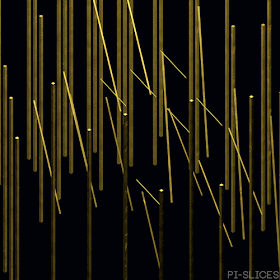ineluctable
adjective | in-ih-LUK-tuh-bul
not to be avoided, changed, or resisted : inevitable
Like drama, wrestling was popular in ancient Greece and Rome. "Wrestler," in Latin, is luctator, and "to wrestle" is luctari. Luctari also has extended senses—"to struggle," "to strive," or "to contend." Eluctari joins e- ("ex-") with luctari, forming a verb meaning "to struggle clear of." Ineluctabilis brought in the negative prefix in- to form an adjective describing something that cannot be escaped or avoided; English speakers borrowed ineluctabilis as ineluctable. Another word that has its roots in luctari is reluctant. Reluctari means "to struggle against"—and someone who is reluctant resists or holds back.
boondoggle
(BOON-dog-uhl)
noun: 1. A pointless project funded as a political favor.
2. A holiday trip to an exotic location, disguised as a business trip.
3. Braided cord, made of plastic strips, fabric, etc.
Coined by scoutmaster Robert H. Link. Earliest documented use: 1929. The original boondoggle was a braided cord made by Boy Scouts. In 1935, a New York Times article quoted someone criticizing a New Deal program to train jobless to make handicrafts as a boondoggle. Since then this sense of the word has become more common.
veld
noun | VELT, a grassland especially of southern Africa usually with scattered shrubs or trees
Veld (also spelled veldt) comes from Afrikaans, the language of the Afrikaners, the descendants of the Dutch and Huguenot people who settled in southern Africa in the 17th century. Literally, veld means "field," and is akin to feld, the Old English predecessor of field. English speakers adopted the Africa-specific sense of veld in the 18th century. Veld refers to open country in southern Africa. Different regions of the veld are distinguished by their elevations. There is the Highveld, the Lowveld, and the Middle Veld, each with different geographical characteristics. Another term associated with veld is kopje (or koppie). This word came to English from Afrikaans (and ultimately from a Dutch word meaning "small head" or "cup") and refers to a small hill, particularly one on the African veld.
Frumious (FROO-mi-uhs)
adjective: Very angry.
Coined by Lewis Carroll as a blend of fuming and furious in the poem Jabberwocky in the book Through the Looking-Glass. Earliest documented use: 1871.














